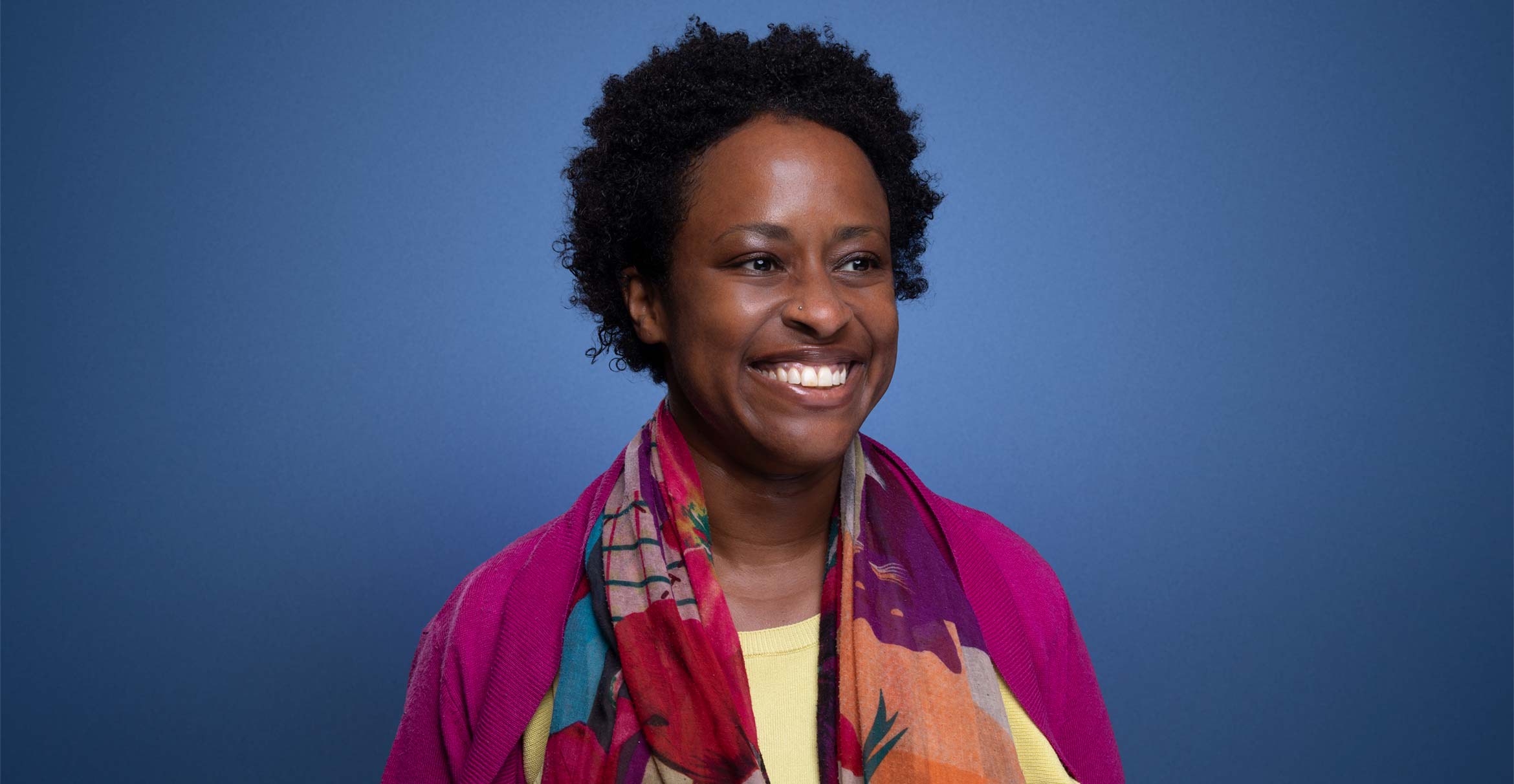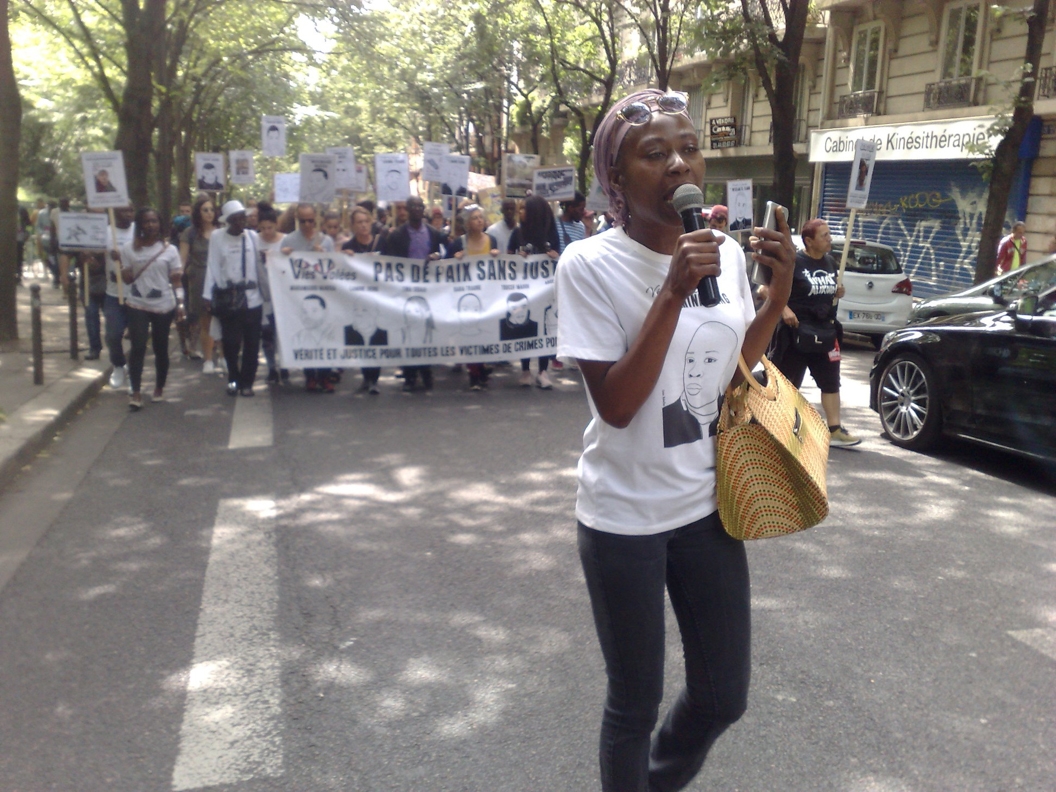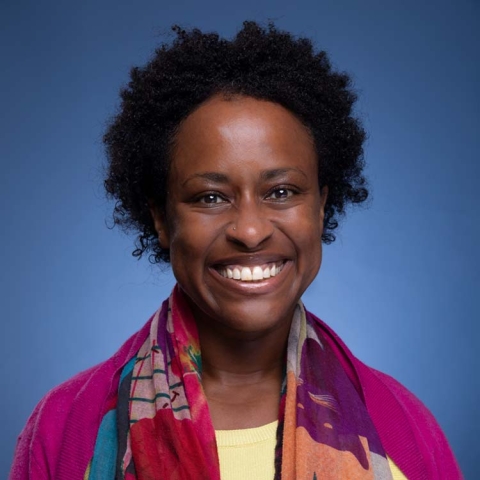
Black Lives Matter in France – Ethnographer Jean Beaman reads transnational connections for Black liberation
Ten years after Black Lives Matter was founded in the U.S., it has reverberated abroad. Today, BLM has global reach and its slogans appear in protests around the world. Anti-racist activists across many nationalities have found a sense of shared experience in BLM, despite cultural and political differences. That capacity to connect resistance movements across borders is the research focus of ethnographer Jean Beaman, who studies how anti-racist activists resist similar structural conditions around the world, and specifically in France.
“Part of this anti-racist movement is evoking transnational connections, the struggle for Black liberation worldwide, including Black Lives Matter, but not just Black Lives Matter,” said Beaman, an associate professor of sociology at UC Santa Barbara, who recently returned to campus from a prestigious fellowship at the Center for Advanced Study in the Behavioral Sciences at Stanford University. In France, she noted, it is common to see the words “Black Lives Matter” on signs or chants at protests or the French version of “No Justice, No Peace,” or even signs that reference victims from the U.S. and other countries besides France.
In one of her two current book projects, tentatively titled, “Suspect Citizenship: Racism and State Violence in France and the World,” Beaman examines “how the specter of state violence or the sort of looming threat of state violence conditions people’s everyday lives and how they resist that assignment.” She argues that we shouldn’t think about state violence or police violence as individual acts, but rather “in the broader umbrella under which they emerge.”
Part and parcel to this work is Beaman’s ongoing research into the context of race and racism in France, where the concept of race is not officially recognized by the state. This line of research continues the work of her first book, “Citizen Outsider: Children of North African Immigrants in France” (University of California Press, 2017), which centers race and ethnicity in understanding marginalization in French society.

Ostensibly France is very different from the United States, particularly in its conceptualization of race, but “there are a lot of similarities in how France and the U.S. think about race and racism, and how they contest it,” Beaman pointed out. Indeed a critical examination of the notion of “color blindness” in France is the focus of her other concurrent book project.
By focusing on how Black Lives Matter is read and interpreted within France, Beaman makes sense of the connections between the BLM movement and longstanding anti-racist struggles in France and broader Europe. Her current work outlines the contours of state violence in France, “theorizing state violence outside of specific killings to overall questions of surveillance and policing.” She also centers the roles of Black feminism and intersectionality, considering how Black women often face anti-racist struggles that affect how they understand their social status.
Conducting extensive ethnographic research in the Parisian metropolitan area between 2017 and 2022, Beaman interviewed 47 activists involved in mobilization against police violence along with family members of victims of police violence, many of whom were activists themselves.
“Most of the people I engage with in my fieldwork are visible minorities, mainly either of West African origin or Caribbean origin, as in descendants of immigrants from former French colonies and overseas,” said Beaman, who has connected with individuals through various collectives and organizations, existing networks and social media pages. Additionally, she conducted participant observation with different organizations at demonstrations related to police violence and anti-racism as well as attending organizational meetings, activist trainings and other types of related events.
“My method is deeply informed by a Black feminist epistemology, which takes seriously my standpoint as a Black woman conducting this research,” Beaman said. In her earlier work, she has written about how her identity as non-French and as a Black American U.S. citizen has allowed her an insider connection with interlocutors, as a fellow ethnic-minority.
Through her multi-year ethnographic investigation, Beaman has met prominent French activists such as Ramata Dieng, whose brother Lamine, a 25-year-old Parisian of Senegalese origin, died in 2007 following a struggle with multiple police officers not too far from the famous Père Lachaise Cemetery. After police restrained him face down on the street, Lamine’s hands were tied behind his back and his feet strapped together. He died, bound in this way, inside the police van en route to the station.
After his death, Ramata Dieng started Stolen Lives Collective (Collectif Vies Volées) as a way to mobilize others against state violence. “She wants us to be a worldwide network connecting what’s happening in France to what’s happening in the United States and around the world,” said Beaman, who met Dieng in 2017. “Through this, she and other activists align with friends and family members of other victims of state violence and also hold yearly demonstrations.”
Another collective that Beaman engages in her research is Ferguson in Paris, which through demonstrations and social media campaigns directly connects specific incidents of state violence inflicted on France’s Black and Maghrebin-origin residents and citizens with state violence against Black Americans — including police killings of Black individuals and the state-sponsored repression of subsequent demonstrations and protests in response.
“This particular collective began after Michael Brown’s death in 2014 and seeks to apply the discourse and actions of Black Lives Matter to the fight of Black populations in France,” she said, “So as they explain, they aim to show that what’s happening in France is happening in the United States and all around the world.”
And, since the death of George Floyd in 2020, this movement toward transnational connections has only grown, Beaman said. Following Floyd’s death, there were demonstrations and protests throughout France, Europe and the rest of the world, in solidarity, “but also in saying, ‘Well, no, this is not just a U.S. phenomenon. It’s also a French phenomenon.’ That’s a lot of the work that activists are doing presently within France.”
The context for her new research, Beaman explained, is a France that constructs itself as “colorblind and race-neutral,” in this sense, differing from the national narrative of diversity and race in the U.S. “French Republicanism emphasizes the relationship between individuals and the state over any other group categorization or identity,” she said in a recent lecture at UC Berkeley’s Institute of European Studies.
“Being French is supposed to supersede any other identification, be it linguistic, religious or ethnic. Race is not considered a legitimate category by the state. It is not measured in the census and recently the word ‘race’ was removed from the French constitution,” she said, adding that talking about race or even using the literal word is seen to exacerbate racism. “And in fact, the United States is often characterized as an example of dangers that can occur when such differences are acknowledged.”
Nevertheless, Beaman pointed out that many scholars of French colonial history have argued that France has historically relied on racial and ethnic boundaries to construct its national identity. “Since France has a long history of colonial slavery, colonialism and related subsequent migration to the metropol, it is necessary to understand how individuals who are descendants of these structures bear contemporary French society,” she said.
“In the case of France, Black and Maghrebin-origin individuals are reminded that they’re not seen as fully French, that they’re incapable of being included in mainstream society.”
Debra Herrick
Associate Editorial Director
(805) 893-2191
debraherrick@ucsb.edu




